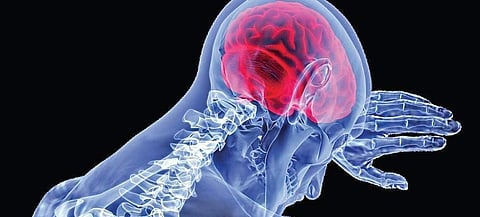

ALAPPUZHA: A 15-year-old boy died of a rare disease caused by a ‘brain-eating amoeba’ in Alappuzha on Friday. Gurudath, son of Anilkumar, Kizhekkemayithra, Panavalli, in Cherthala, who was diagnosed with primary amoebic meningoencephalitis (PAM), had been undergoing treatment for the past six days. He breathed his last at the Alappuzha Medical College Hospital.
The water-borne amoeba — naegleria fowleri — usually found in polluted pond water or canals, enters the brain through small tissues in the nose. The teenager had taken a bath in the pond near his house last week. It may be how he was infected, said officials.
“The teen was admitted to Thuravoor Taluk Hospital with a headache and fever last Saturday. He had also lost his eyesight. Later, he was shifted to the Alappuzha MCH, where the disease was diagnosed,” said the Alappuzha district medical officer (DMO). He was admitted to the ICU due to his poor health condition, and a team of expert doctors gave him the necessary treatment. On July 6, his condition worsened, and he died in the wee hours of Friday.
In the wake of the detection of the disease, Minister Veena George said there was no need for panic, but added that utmost care should be taken while bathing in ponds and canals filled with muddy water. “The boy’s samples have been sent to Jawaharlal Institute of Postgraduate Medical Educational and Research, Puducherry, for confirmation,” she said.
Min: Health dept carrying out adequate preventive measures
Veena George said the disease is very rare and affects only one in 10,000 people. Veena, in a statement, said the health department is carrying out adequate preventive measures in the area in Alappuzha where the disease has been detected.
In the past seven years, five people have been diagnosed with this disease in the state. “The first case was reported in the Thirumala ward of Alappuzha municipality in 2016. Later, two cases were reported in Malappuram, and one case each in Kozhikode and Thrissur,” Veena said. The mortality rate of the disease is close to 100%.
As soon as the notification regarding the child’s illness was received from the medical college hospital, the district medical office started necessary preventive measures. An awareness class has been conducted for the local residents, Veena said in the statement.
“The risk of contracting ameobic meningoencephalitis is high when bathing in natural ponds. If someone is using a pond for swimming, it is recommended to use bleaching powder to minimise the risk. Although this condition is rare, it’s important to note that not everyone who bathes in the same pond will necessarily get the infection.
Informing the treating doctor about any history of swimming is crucial for early diagnosis and appropriate medical care,” said Dr Sheeja Sugunan, a paediatric intensivist and associate professor, the Department of Paediatrics, Sree Avittam Thirunal Hospital, Thiruvananthapuram. Gurudath’s funeral was held on the premises of his house at Panavalli. He was a class 10 student at SN HSS, Poochakkal.
What is PAM?
PAM, also known as Naegleriasis, is invariably a fatal infection of the brain by the free-living, unicellular eukaryote, naegleria fowleri. Its symptoms include meningitis, headache, fever, nausea, vomiting, stiff neck, confusion, hallucinations, and seizure. Symptoms progress rapidly over around five days